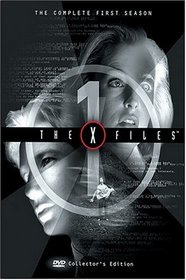| Actors: David Duchovny, Gillian Anderson, Charles Cioffi, Cliff De Young, Sarah Koskoff Director: Robert Mandel Creators: Thomas Del Ruth, Stephen Mark, Chris Carter, Daniel Sackheim Genres: Drama, Science Fiction & Fantasy, Television, Mystery & Suspense Sub-Genres: Drama, Sci-Fi Action, Alien Invasion, Aliens, Drama, Science Fiction, Mystery & Suspense Studio: 20th Century Fox Format: DVD - Color - Closed-captioned DVD Release Date: 05/09/2000 Original Release Date: 09/10/1993 Theatrical Release Date: 09/10/1993 Release Year: 2000 Run Time: 0hr 46min Screens: Color Number of Discs: 7 SwapaDVD Credits: 7 Total Copies: 0 Members Wishing: 0 Edition: Box set,Collector's Edition MPAA Rating: Unrated Languages: English, French Subtitles: English, Spanish See Also: |
Search - The X-Files - The Complete First Season on DVD
  | The X-Files - The Complete First Season Actors: David Duchovny, Gillian Anderson, Charles Cioffi, Cliff De Young, Sarah Koskoff Director: Robert Mandel Genres: Drama, Science Fiction & Fantasy, Television, Mystery & Suspense UR 2000 0hr 46min In the first season of The X-Files, creator Chris Carter was uncertain of the series' future, so each of the episodes is a self-contained suspense story; they do not delve deep into the ongoing X-Files mythology or turn to... more » |
Larger Image |
Movie DetailsSimilar Movies
Similarly Requested DVDs
|
Member Movie ReviewsReviewed on 9/25/2014... I never know really how to review my favorite shows. There's some seasons I like better then others and so on but with the X-Files I think there was only one season I didn't care for other than that this show is amazing!! Only thing I always hated were the cliff hangers. lol 1 of 2 member(s) found this review helpful.
Movie ReviewsThe first few seasons were the best! Lynda Lytle | Erie, PA USA | 06/17/2010 (4 out of 5 stars) "It was some of the best science fiction work on TV since Rod Serling's Twilight Zone. As they stuck to their original premise, the first three seasons hummed along, never stretching for a story, not going for trite tricks or stupid humor." The beginning of many great things to come. Sugarplumeferry | Pittsburgh | 05/21/2010 (5 out of 5 stars) ""Sorry, nobody down here but the FBI's most unwanted."
The sci-fi benchmark of the 1990s and beyond, Chris Carter's "The X-Files" would go on to span nine critically acclaimed seasons and two feature length films in the course of fifteen years, making David Duchovny's schizotypal Fox "Spooky" Mulder and his counterpart, the incredulous Dana Scully (portrayed by the lovely Gillian Anderson), into household names, and cementing the maxims "the truth is out there" and "trust no one" into the minds of countless steadfast devotees. The series kicks off with a strong first season, beginning in 1993, and building the foundation of the relationship between our two agents that would best the kitsch of any drama in its timelessness and dynamic caliber. There are a few stark differences between the seminal season and the ones that followed - most notably the diminished presence of the mythology arc that would really take off in Season 2 onward, and also the greater number of stand-alone, "Monster-of-the-Week"-type storylines that constitute a bulk of the season. What this means is that the first year serves as more of a vessel for character development than plot advancement (a trend that is still common today in shows such as Lost). It also means that a lot of recurring characters have yet to be woven into the storyline, with the exceptions of the notorious Cigarette-Smoking Man, the elusive Deep Throat, and Assistant Director Walter Skinner who makes his first appearance in "Tooms." As the series began to find its footing, and Nielsen ratings slowly began to increase, the show does not display quite the same level of self-confidence as it would in the years to come. While this would result in a small handful of subpar episodes, it would also pave way for some fantastic ones, such as the dreadful "Squeeze" in which a contortionist hunts for human livers, and its aforementioned sequel, the even more dreadful "Tooms." The brilliant Brad Dourif portrays a medium in season linchpin "Beyond the Sea," in which Anderson's Scully shares the spotlight. Other noteworthy stand-alones include the John Carpenter homage "Ice," featuring an early appearance by Desperate Housewives star Felicity Huffman, the delightfully creepy "Eve," "Fire," and the tension-packed "Darkness Falls." The negatives: with only one foot in the water, the series had yet to reach the heights it eventually would with later seasons, and as such, there is some middle-of-the-road fare to be found - namely the near-unanimously despised "Space," which suffers from a tedious script and hokey special effects; "Lazarus," which isn't bad per se, but not enthralling either; and "Fallen Angel," which, while featuring a terrific guest cast, suffers from a cheesy 80s-esque soundtrack and also weak effects. Still the worst of The X-Files is still neck and shoulders above the best of some series, and only being the first season, these can easily be overlooked. The X-Files was without a doubt the forerunner of science-fiction in the '90s, and is a must for anyone seeking engaging, suspenseful, and rewarding television." |















